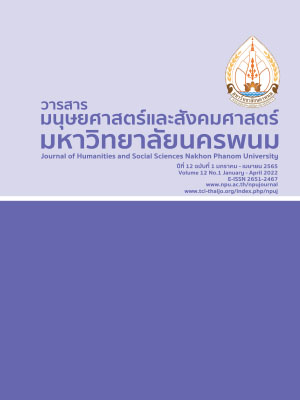Influence of Perceived Organizational Support, Work-Life Balance, and Subjective Well-Being on Intention to Stay of Commercial Employees in an Airline
Main Article Content
Abstract
The objectives of this research were to study: perceiving level organizational support, work-life balance, subjective well-being, and intention to stay of commercial employees in an airline and influence of perceived organizational support, work-life balance, and subjective well-being on intention to stay of commercial employees in an airline. The sampling of this research were consisted of 274 commercial employees in the airline companies in Bangkok. The research data was collected by questionnaires and reliability was 0.97. Analytical statistic employed were percentage, mean, standard deviation, and stepwise multiple regression analysis. The results of the research showed that: 1) commercial employees in the airline companies that presented overall highly level of perceptions in organizational support including; highly level of work-life balance; overall subjective well-being and intention to stay; and 2) perception in organizational support in part of fairness, work-life balance, and subjective well-being in part of life satisfaction could jointly predict intention to stay of commercial employees in the airline companies around 20% as reaching at .05 level of significance.
Article Details

This work is licensed under a Creative Commons Attribution-NonCommercial-NoDerivatives 4.0 International License.
References
Attar, M., Cagliyan, V., and Kareem, A. A. (2021). Evaluating the moderating role of work-life balance on the effect of job stress on job satisfaction. Istanbul Business Research. 49(2), 201-223.
Bell, M., and Sheridan, A. (2020). How organizational commitment influences nurses’ intention to stay in nursing throughout their career. International Journal of Nursing Studies Advances. 2, 1-12.
Board of Directors. (2010). khūmư̄ pramūan bansatphibān læ čhariyatham [Handbook of Corporate Governance and Ethics]. Bangkok: Airline personnel service center.
Bukhari, S. R., Alam, N. A., Batool, A., Hussain, Y., Asim, S., Khatttak, N. and Tabassum, S. (2020). Perceived organizational support predicts emotional labor among nurses. Asian Social Science. 16(2), 68-73.
Business Development and Corporate Strategy Department. (2019). rāingān kānphatthanā yāng yangyư̄n pī 2562. [Sustainable Development Report 2019]. Bangkok: Business Development and Corporate Strategy Department of Airline.
Clapham, D., Foye, C., and Christian, J. (2018). The concept of subjective well-being in housing
research. Housing, Theory and Society. 35(3), 261-280.
Faloye, D. O. and Owoeye, I. (2019). Diversity, work-life balance and employee’s performance in Nigeria: A survey of tertiary institutions and bank in Odor state. International Journal of Business and Management Studies. 8(1), 175-192.
Hudson, H. (2005). The case for work/life balance: closing the gap between policy and practice. New York: Hudson Highland Group.
Jobcute. (2019). mat čhai phanakngān yāngrai phư̄a lot ʻattrā kān lāʻō̜k [How to tie up employees to reduce intention to leave rates]. Retrieved March 12, 2021. From https://news. jobcute.com
Jobthai. (2017). hā withī sāng Work - Life Balance yāng mī prasitthiphāp [5 Ways to create an efficient work-life balance]. Retrieved January 19, 2018. From https://www.jobthai.com/REACH/career- tips/5.html.
Karim, D. N., Baset, M. A., and Raham, M. (2019). The effect of perceived organizational support on intention to stay: The mediating role of job involvement. The Jahangirnagar Journal of Business Studies. 8(1), 21-30.
KinKao. (2019). ʻarai khư̄ tonhēt thī thamhai khwām suk nai kānthamngān hāi pai ? [ What is the reason why loss of happiness at work?]. Retrieved April 9, 2021. From https://kinkao.co.
Krobkruakaosam. (2017). ʻutsāhakam kān bin khưkkhak lang ICAO plot thong dǣng. [Thai aviation industry got the red flag]. Retrieved November 10, 2017. From http://www.krobkruakao.com.html.
Lazim, B. M. (2017). The mediating role of perceived organizational support on the relationship between
pay and intention to stay. Management Review: An International Journal. 12(1), 57-76.
Lindfelt, T., and Gomaz, A. (2018). The impact of work-life balance on intention to stay in academia:
Results from a national survey of pharmacy faculty. Research in Social and Administrative
Pharmacy. 14(4), 387-390.
Lindsay, J. (2017). What makes people decide to stay in a role or quit ?. Retrieved March 16, 2019.
From https://iopenerinstitute.com/happiness-work-intention-stay/.
Michael, E. and Larsen, R. (2008). The Science of Subjective Well-Being. New York: The Guilford Press.
Muchlish, M. and Budianto, R. (2020). Antecedents of perceived organizational support to improve organizational commitment in the public sector institutions. Journal of Accounting
Research, Organization and Economics. 3(2), 163-171.
Nimri, R., Patiar, A., Kenbock, S., and Jin, X. (2019). Consumers’ Intention to stay in green hotels in Australia: Theorization and implications. Journal of Hospitality & Tourism Research. 44(1), 1-20.
Ratchagit, T. (2019). siphā sāhēt lak thī phanakngān čha khō̜ lāʻō̜k [15 main reasons why employees are asking for resignation] Retrieved March 27, 2021. From https://iopenerinstitute.com/happiness- work-intention-stay/.
Ratchagit, T. (2020). yīsip khletlap kap kānsāng samadun rawāng chīwit læ kānthamngān [20 tips for balancing work-life] Retrieved January 29, 2021. From https://th.hrnote.asia/personnel- management/190725-work-life-balance/,
Rena, W. A. and Desiree, H-F. (2020). Investigating information technology skills retention challenges in South Africa’s public sector. African Journal of Science, Technology, Innovation and Development. 13(3), 1-9.
Ritjaroon, P. (2011). rabīap withīkān wičhai [Research Methodology]. Bangkok: Phranokhon Rajbhat House.
Shahid, A. (2018). Employee intention to stay: An environment based on trust and motivation. Journal of Management Research 10(4), 58-71.
Snyder, C. R., Lopez, S. J., and Pedrotti, J. T. (2011). Positive psychology: The scientific and practical explorations of human strengths. 2nd ed. California: SAGE Publications, Inc.
Sunday Inn. (2018). prakan sukkhaphāp klum sing čhūngčhai phanakngān thī mai khūan mō̜ng khām [Group health insurance Employee incentives that should not be overlooked]. Retrieved January 29, 2021. From https://easysunday.com/blog/why-employee-benefits-are-important/.
Suthamanon, L. (2017). konlayut kānbō̜rihān sapphayākō̜n manut phư̄a ʻongkō̜n yangyư̄n [Human Resource Management Strategy for a Sustainable Organization] Bangkok: Chulalongkorn University Printing House.
Wahyanto, T., Damayanti, N. a., Supriyanto, S. and Hatini, S. (2019). Effect of happiness at work on employee engagement and intention to stay of hospital employees. Indian Journal of Public Health Research & Development 10(12), 2017-2022.
Warren, S. T. (2020). Employee-perceived organizational support and supervisor support predicting
affective employee commitment in a healthcare organization. Dissertation for Degree of Doctorate of Education. Grand Canyon University, Arizona, USA.
Wonganutarot, P. (2010). čhittawitthayā kānbō̜rihān ngān bukkhon [Human Resource Management Psychology] Bangkok: Bangkok Software Technology House.


